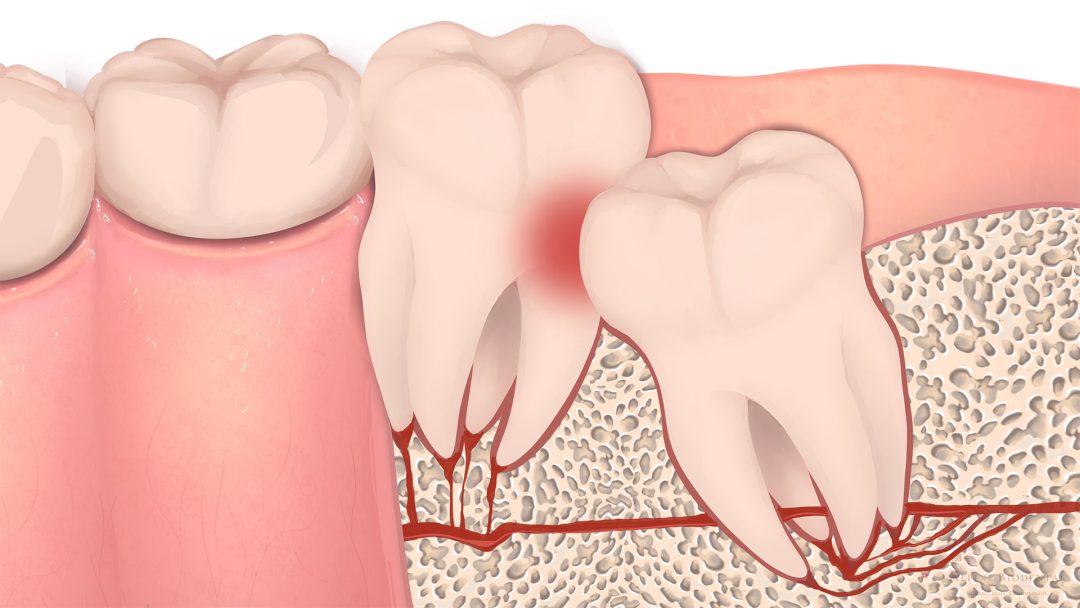Wisdom Tooth Extraction

A wisdom tooth extraction is a common dental procedure that involves removing the wisdom teeth from the jawbone. Wisdom teeth, located at the end of the dental arch, usually erupt between the ages of 16 and 30. However, insufficient space often obstructs their eruption, leading to various complications and necessitating a wisdom tooth extraction. In this article, we will explain what you should consider before having your wisdom teeth removed.
Wisdom tooth extraction: options available
There are various options and approaches when it comes to extracting wisdom teeth. All wisdom teeth can be removed in a single session or divided into multiple treatment sessions. The type of anesthesia is also a consideration; while local anesthesia is typically sufficient, general anesthesia may be advisable in certain situations.
- Extracting all four wisdom teeth at once: Advantages include avoiding additional surgeries and achieving a quicker overall treatment. This minimizes work or school absences, enabling a faster return to normal activities.
- Removing one side first and then the other: This allows the use of one side for chewing after the operation, making it more comfortable. Sleeping on the non-operated side is also preferable.
- Wisdom tooth extraction under local anesthesia: This is the preferred method and can be applied even in challenging cases with wisdom teeth.
- Wisdom tooth removal under general anesthesia: Recommended for patients with dental anxiety, this method allows for treatment while in a state of deep sleep.
Dr. med. dent. Josephine Phillips
When extracting wisdom teeth, the procedure should be atraumatic and should include important biological procedure steps. In this way, inflammation can be prevented.

Symptoms of wisdom teeth eruption
When wisdom teeth are erupting and there is a lack of space, various symptoms can occur.
The symptoms are noticeable in the form of pain, which can extend to the ear. There may also be a restriction in chewing function and difficulty swallowing. A discharge of
a yellowish liquid in the area of the wisdom teeth indicates pus, which can lead to bad breath in those affected.
If the symptoms spread to the whole body, fever, weakness and enlarged lymph nodes may occur.
Indications for wisdom tooth extraction
Not everyone needs to have their wisdom teeth removed. A precise assessment often requires X-rays performed by a dentist. However, some indications suggest the need for wisdom tooth extraction, including swelling, pain, pressure in the jaw, or a foul odor from the area around a wisdom tooth. The definitive decision on the necessity of wisdom tooth extraction can only be made by a dentist.
Wisdom tooth pain
Pain can occur before and after a wisdom tooth extraction. Pain before the operation may result from significant gum inflammation around the wisdom tooth or cavities.
Post-operative pain may occur in the first few days but should gradually decrease and disappear within 7 to 14 days. If constant or increasing pain persists five days after the extraction, it is advisable to contact your dentist.
Wisdom tooth inflammation
Wisdom tooth inflammation causes severe pain and can manifest different symptoms before and after the extraction. Before the operation, throbbing pain may occur, accompanied by difficulties in eating, speaking, and swallowing. The area around the wisdom tooth may feel swollen when touched, and facial swelling may occur.
Post-operative inflammation can also cause severe pain. To avoid such inflammation, the surgeon should use minimally invasive techniques, thoroughly disinfect the wound with ozone, insert A-PRF membranes, and ensure proper suturing. Pre-operative buildup of oral flora is highly recommended.
Wisdom tooth swelling
Swelling around wisdom teeth can occur before or after surgery. This swelling is a sign of inflammation and can cause significant pain upon touch. Before surgery, it indicates that the wisdom tooth should be extracted. After wisdom tooth removal, swelling should gradually decrease within 3 days.
Wisdom tooth extraction procedure
A minimum of three appointments is required for wisdom tooth extraction.
First Appointment - Consultation
During the first appointment, a discussion will take place, and the precise location of the wisdom teeth will be determined using cone beam computed tomography (CBCT) scans. Identifying the location is crucial to avoid harming neighboring teeth, sinus cavities, and nerves, ensuring atraumatic procedures.
Second Appointment - Wisdom Tooth Extraction
Review of the procedure and blood collection for A-PRF.
- Anesthesia (exposure approx. 10 - 15 minutes)
- Gum incision (incision)
- Wisdom tooth exposure by removing bone (osteotomy)
- To minimize bone defects, the tooth is separated (split), allowing for the removal of the crown part first and then the roots individually
- Cleaning and disinfecting the wound with ozone, inserting A-PRF membranes.
- Finally, suturing the wound
The duration of a wisdom tooth extraction is approximately 30 minutes per area, with possible variations based on the complexity of the extraction.
Third Appointment - Follow-up after 7-14 Days
- Wound check and suture removal
- Prophylaxis
After wisdom tooth extraction
After a wisdom tooth extraction, it is crucial to rest both physically and mentally in the following days, get adequate sleep, and avoid excessive activity. This recovery period is essential for proper wound closure and reduces the risk of infections.
Immediately after surgery, the operated area should be cooled using cold packs or a Hilotherm cooling mask. Care should be taken not to overcool, as this can impede lymphatic drainage.
Approximately 7 to 14 days after the wisdom tooth extraction, everything should return to normal, with the wounds fully closed.
Alcohol and eating after wisdom tooth extraction
If the wounds are stitched, you can resume eating soft foods a few hours after the wisdom tooth extraction. Avoid hard (e.g., crusty bread) and hot foods for 7 to 10 days to avoid interfering with wound healing. Alcohol should also be avoided for 7 to 10 days.
Smoking after wisdom tooth extraction
Smoking after a wisdom tooth extraction has adverse effects on wound healing and should be avoided for 7 to 10 days. Smoking increases the risk of postoperative infection and pain.
Exercise after wisdom tooth extraction
No sports should be performed for 7 to 10 days after a wisdom tooth extraction. Rest, recovery, and sleep are crucial immediately after the operation, while exercise can negatively impact regeneration.
Possible complications during removal
Various complications can occur during wisdom tooth extraction. To minimize the risk, such procedures should be performed by experienced oral surgeons. Dentists who occasionally extract wisdom teeth are more prone to errors, leading to a higher likelihood of complications.
Opening of the maxillary sinus
There is a risk of opening the maxillary sinus with upper wisdom teeth. This condition, known as an oroantral communication (OAC), creates a connection between the mouth and the maxillary sinus. In such cases, patients should refrain from blowing their nose for at least 2 weeks, and sneezing should not be suppressed (only sneeze with an open mouth).
Numbness in the lower jaw
In rare cases, damage to the inferior alveolar nerve may cause temporary numbness in the lower jaw. Sensation usually returns gradually and is reversible. High-dose vitamin B complex and Hypericum (homeopathic) can accelerate recovery.
Injury to adjacent teeth
Careless removal may lead to damage to neighboring teeth. This is especially true when using a lever, with the neighboring tooth serving as a force fulcrum. In most cases, injuries are reversible and without permanent consequences.
Our trained specialists, Dr. Josephine Phillips and Dr. Rebekka Hueber, are the right contacts for the correct removal of wisdom teeth.
Wisdom tooth extraction costs
The costs associated with wisdom tooth extraction depend on the difficulty and location of the teeth, as well as the additional methods applied. Fully erupted wisdom teeth incur lower costs than impacted and displaced teeth.
Frequently asked Questions about Wisdom Teeth
Patients often have various questions about wisdom teeth. Here are concise answers to common uncertainties about wisdom teeth.
Typical signs include swelling, pain, pressure, or a foul odor.
After a wisdom tooth extraction, one may feel unwell for a few days and is typically medically excused for about 7 days.
No, wisdom teeth do not always need to be removed. A dentist can make a precise decision with the help of X-rays.
The main reasons why wisdom teeth have to be removed are:
- Lack of space in the wisdom teeth
- Formation of pockets of dirt around the wisdom teeth
- Caries
Wisdom teeth can be extracted at an older age. However, they are often more firmly attached to the bone in older individuals.
Cooling is recommended for the first 2 to 3 days after wisdom tooth extraction, but overcooling should be avoided.
Sleeping with a slightly elevated head helps lymphatic drainage for reduced swelling. Use a double pillow for this purpose.
Most people have wisdom teeth, but some individuals may not develop them.
Typically, a person has 4 wisdom teeth.
After a wisdom tooth extraction, avoid brushing the operated area for a few days. Subsequently, brush gently with a very soft toothbrush, ensuring it is not painful or uncomfortable.
It is possible to remove all 4 wisdom teeth in one day. However, if this is too much for you, you can also have the teeth removed side by side.
It is advisable to have an optimal vitamin D3 level, ideally around 70 ng/ml.
Immediately before the procedure, it is important that you have eaten and drunk something, as we need to take a blood sample to prepare the A-PRF membranes.
Wisdom teeth normally emerge from the jawbone into the oral cavity between the ages of 17 and 25. If you take the average, wisdom teeth are fully erupted by the age of 22 in men and 23.5 in women.
Further information
Here you will find further information on the subject for a deeper insight.